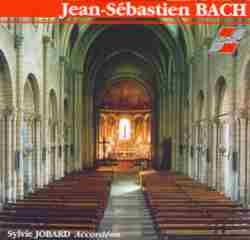
Program:
Prelude and Fugue in A Minor, BWV 543
Italian Concerto, 3rd Movement
Choral: Jésus que ma loie demeure from Cantata No. 147
15 Two Part Inventions
petit prelude, BWV 936
total time: 47:05
released: 1998
review date: August 1999
S.E.P.M. Quantum
54, avenue de Jussieu
91600 savigny-sur-Orge
Phone: 01 69 24 70
FAX: 01 69 24 44 55
Email: quantum@easynet.fr
Review by Henry Doktorski :
Johann Sebastian Bach (1685-1750) happens to be my favorite composer. Not only is he regarded as the greatest musical genius (composer and organist) of the Baroque era, but he was also a very religious man and recognized that his creativity was inspired by a higher power; hence his motto Soli Deo Gloria: to God the glory.
The French accordionist Sylvie Jobard, follows in Bach's footsteps; her performance was recorded at la Basilique de Longpont-sur-Orge. The interior of the church is pictured on the CD cover; it is not so small that the sound evaporates into thin air, nor is it so large (like the cathedral of Notre Dame, for instance) that the sound reverberates forever. I think the acoustics were perfect for the sound of the chamber organ, or accordion.
I remember playing Bach's Italian Concerto -- originally written for harpsichord -- during my senior piano recital twenty-five years ago. It is one of my favorite keyboard works. Jobard plays it with conviction and life; in my opinion, a fine performance. I only wish she had played all three movements; I get tired of hearing bits and pieces from larger works.
The Prelude and Fugue in A Minor is a large organ work which is popular with classical accordionists, perhaps because it can be played more-or-less note-for-note without much transcription. I have heard four or five recordings of other accordionists playing the piece. In general, I am not impressed with accordion performances of organ works; the accordion cannot come anywhere close to the power and depth that a pipe organ possesses. A six inch reed cannot compete against a thirty-two foot pipe.
However, the accordion can shine in its own way; it has a wonderful subtlety of dynamic control and the treble has its own characteristic brightness. Jobard admirably utilizes the resources of the accordion to reveal some of the sonic delicacies in the upper voices of the fugue.
I was unimpressed with the famous choral: Jesu, Joy of Man's Desiring. Jobard's rendition was to me dreary and ponderous, not light and airy. If I had my way, I'd make her listen to some recordings of the original cantata orchestration for orchestra and choir.
I'm grateful that Jobard included ALL of the 15 two-voice inventions on her CD; truly a wonderful program and much needed. Thank you! The inventions were composed as teaching works for Bach's students and they are little masterpieces of contrapuntal writing. For the most part, Jobard plays them well; although I was disturbed by the inconsistency of playing final chords much too loud. It reminded me of a talented speaker beautifully reciting a book of diverse poems, but ruining each one by shouting the last word in each, regardless of the content. No subtlety. Invention no. 1, invention no. 2, no. 3, etc., all were delicate pieces, but had uncharacteristically loud and bombastic endings. I stopped counting. Of course, there were final cadences which were dynamically appropriate: No. 6 comes to mind.
My second criticism: why didn't she change any registrations during the 15 inventions? I believe an organist or harpsichordist would add or subtract stops depending on the character of the piece. Invention no. 8 in F is a light dance-like piece; I think a single 8 foot clarinet reed in the right and left-hand manuals would sound better than playing the 8 foot plus 4 foot stops (oboe) in octaves. Perhaps I didn't hear properly, but it sounded like both hands were playing coupled in octaves; consistently tiring.
Of course there are great things about this CD: I cannot fault Jobard on her technique; she really is a master technician. I can only suggest that a little more varied interpretation of the inventions would transform a good recording into a superb one.
Despite my faultfinding, I think this CD will be appreciated by all classical free-reed lovers. It's not every day when an all-Bach solo accordion CD is released. This in itself is a cause for celebration, and I sincerely thank Sylvie Jobard for her contribution to the classical accordion discography.
Sylvie Jobard was born in Belfort, France, and began music studies at the age of six. She early on became infatuated with the accordion and won many prizes in national and international competitions. Studied at the Schola Cantorum in Paris with Yvette Horner, Myriam Boonin and André Daucby.
From 1975 to 1978 she won the first prize in several important competitions, most notably The Gold Medal of the Accordion (Bevaix, Switzerland), A.C.F (Paris), the President of the Republic prize and the Sacem prize. She has taught since 1979 at the national school of music of Montreuil-sous-bois and at Longpont and Villiers sur Orge school of music.
| About The Free-Reed Review |
| Invitation to Contributors / Submission Guidelines |
| Back to The Free-Reed Review Contents
Page |
| Back
to The Classical Free-Reed, Inc. Home Page |